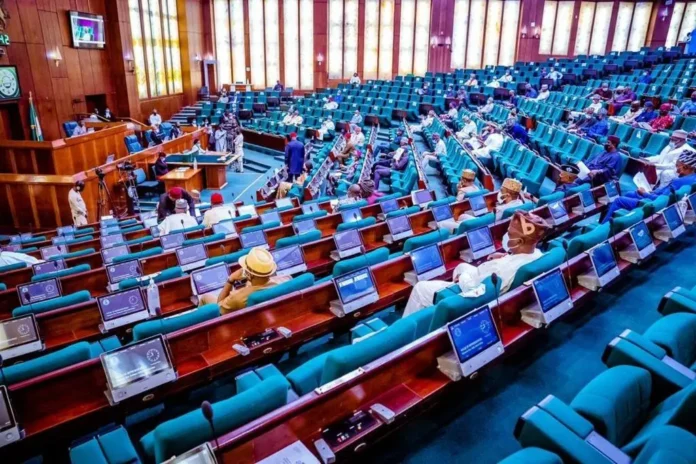Chairman of the House of Representatives Committee on Solid Minerals, Hon. Jonathan Gaza, revealed on Monday that Nigeria loses approximately $9 billion annually due to illegal mining activities across the country.
Gaza made this statement in Abuja during the opening of an investigative hearing into illegal mining activities, underreporting of extracted products by mining and quarry license operators, utilization of financial interventions in the Nigerian solid minerals sector, and discussions on the Nigeria Minerals and Mining Act (amendment bill) and Nigeria Solid Minerals Development Company (establishment bill).
He stated, “The leadership of the 10th House of Assembly has deemed it crucial to conduct these investigative hearings to promote transparency, accountability, public participation, policy formation, and to identify challenges and solutions that will ultimately revitalize our solid mineral sector.
“As we all know, illegal mining poses significant risks to our nation’s economy, environment, and security. The unregulated exploitation of our natural resources endangers the sustainability of the mineral sector, leading to environmental degradation and revenue losses that could benefit our communities and nation as a whole.
“It is imperative that we urgently take decisive steps to address this issue and ensure that our solid mineral sector operates within the legal framework, protecting our natural resources for future generations.
“Furthermore, as representatives of the people, the parliament is deeply concerned about the loss of revenue through unregulated and illicit mining operations, with the Federal Government disclosing that unlawful mining costs the country $9 billion each year, with the only revenue coming from a 3 percent royalty paid by the few licensed miners.
“This development hinders the country’s ability to maximize the benefits from its mineral resources.
Additionally, there is the grave concern about the negative impacts of illegal mining, which has led to insecurity and conflicts over control of mining sites and their resources.
These conflicts have escalated into violence, exacerbating existing political and social tensions in affected communities, and resulting in limited data availability and inadequate measures to control this illicit practice.”
He emphasized that the public hearing serves as a valuable platform for collecting insights, information, and recommendations from stakeholders, experts, and affected communities. “By attentively listening to their testimonies and perspectives, we can gain a deeper understanding of the challenges posed by illegal mining and develop effective strategies to combat this illicit activity.

I call upon all participants to engage in constructive dialogue, share their experiences, and offer practical solutions that will guide our legislative efforts towards effectively regulating the solid mineral sector.”
In his remarks, the co-chairman of the joint Committees, Hon. Balele Aminu, highlighted the critical issue of national importance. “Last week, I found myself in another Committee discussing oil theft when I received submissions from various professional organizations. I think we need support and prayers from Nigerians. This is the most critical aspect today; we are looking for revenue, and there is revenue here.
“We are looking for money, and people are saying that we don’t have money in Nigeria, but there is money in the mining sector. However, the challenge is enormous. We need the support of Nigerians through memos, inputs, and other contributions.”
Hon. Aminu, who also serves as Chairman of the House Committee on Army, noted, “The money that is going out from illegal mining is more than what is going out from the oil sector and bunkering. We need to come together, work together, and see how we can assist our nation.”
While declaring the hearing open, Speaker Tajudeen Abbas, represented by the Majority Leader, Hon. Julius Ihonbvere, asserted that illegal mining in Nigeria has significant implications for the nation’s economy. He emphasized that the outcome of the comprehensive investigation into the reported illegal activities and the Committees’ recommendations will guide the House in taking necessary legislative actions. He solicited the cooperation of all stakeholders in addressing this menace.
He stated, “We are all aware that illegal mining activity is a growing socio-economic challenge in Nigeria, which has brought innumerable economic losses to the nation’s economy. It has increased poverty levels, especially among peasant farmers who depend solely on environmental resources for a living.
“Nigeria is richly blessed with solid minerals, which should bring great fortune to the country and its citizens. However, the wealth is largely stolen by criminal elements who do not mean well for this country.
Available reports indicate that an estimated 80% of mining in the North West region, for example, is carried out illegally, and the mining of large untapped mineral deposits in the area is the root of community violence. It is the same story in many parts of the nation.
“The House considers illegal mining as an economic sabotage and prioritizes this investigative hearing, especially because many communities with mineral deposits, which should ordinarily be a blessing to them, live in agonizing conditions, economically and socially, arising from years of neglect, various deprivations, and severe environmental degradation, air, and water pollution due to the activities of illegal miners. The unprecedented illegal mining across Nigeria must be stopped.”




